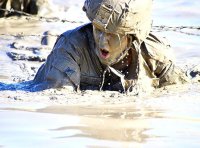































This blog originally appeared on the HuffingtonPost
"We ask these men and women (veterans) to leave their families and their jobs and risk their lives to fight for our country. The last thing they should have to do is fight for a job when they get home."
-President Obama
I can still remember the moment. I gazed out of my window at the beautifully lit Verrazano Bridge from my apartment in Brooklyn, N.Y. - one late evening in March 2003. A year and a half had passed since Sept. 11 and an address from President George W. Bush interjected the usual television programming. It was to announce the beginning of the war with Iraq.

I enlisted into the military as soon as I could. While most high school seniors were applying to colleges all around the city, I headed to military recruiting offices. As part of a family that has served in the military since the Revolutionary War, it made sense why this was the only thing that felt right to me.
By September 2011, a 1-year deployment to Baghdad, Iraq that I had volunteered for came to an end - and it was time to begin the transitioning process back into the civilian world. For many service members, it can be a struggle to re-acclimate back into the life that they left behind. A report completed by the Business and Professional Women's Foundation found that it takes an average of 7 years for female veterans to become fully acclimated to civilian life after returning from a deployment.
The first and biggest piece of advice that I would give to a transitioning veteran is to take advantage of the programs that are available - there are people out there just waiting to help you. The Air National Guard has a Yellow Ribbon program for service members returning from long-term assignments - in order to help them transition back into the civilian lifestyle. It was here that I signed up to be a part of the Veterans Affairs (VA), where I would be provided with 5 years of free health care, and assistance with transitioning.

I became a part of the Operation Enduring Freedom/Operation Iraqi Freedom Returning Vets group, where I had a single point of contact who helped me transition back into school, find a job, and introduced me to a program for veterans called Warrior to Cyber Warrior (W2CW). After applying, and going through an interview process, I was 1 of 10 students (out of hundreds of applicants) to be selected for the very first W2CW cohort.
The program consisted of six months of online-based training on cyber security. This program also provided me with the tools I needed to study and pass the CompTIA Security + Exam, at no expense to me. It was because of the W2CW program, I earned my first IT certification. The end goal of the W2CW program is to place veterans in a job role where these new and very beneficial skills can be utilized.
Today, I am working for Cisco Systems as a Network Consulting Engineer, using my knowledge of cyber security, my security clearance, and past experiences from the military all in one place. And it all began with taking the first step and signing up for a program that was there to assist a transitioning veteran such as myself.
Since becoming a part of the Cisco team, I have earned my CCNA (Cisco Certified Network Associate) and CCNP (Cisco Certified Network Professional) Firewall certifications. I am currently working toward my CCNP Routing and Switching certification.
Veterans, take advantage of the G.I. Bill. By utilizing this resource that you have rightfully earned - you can make yourself more valuable by working toward your degree - or even gaining IT certifications (Cisco, Microsoft, CompTIA). Veterans can even use the G.I. Bill to enroll in Cisco Networking Academy courses offered at accredited colleges - which provide a pathway to entry-level ICT jobs, further education, and globally recognized industry certifications.
These are accomplishments that can be added to your resume - and set you apart from your peers during the job search. Not only does a degree and/or IT certifications prove that you have the know-how - but it shows that you went above and beyond by dedicating time to study and prepare.
And it doesn't take an IT Military Occupational Specialty (MOS) or Air Force Specialty Code (AFSC) to become an IT professional. Veterans provide employers with a priceless asset; the skills they acquire in the military such as resilience, drive, and leadership are highly appreciated by employers.
Technology-driven programs such as Warrior to Cyber Warrior, Hero 2 Hired, or U.S. IT Pipeline can help veterans find rewarding careers in a growing industry. Military veterans can find a pathway to a rewarding career the IT job sector by taking advantage of training programs targeted specifically to them.
Veterans (even if the odds seem stacked against you): Always remember that you possess a set of valuable qualities and skills that will make you extremely valuable to any organization. Never forget the moment you stood ever-so-proudly with your right hand raised - and swore to defend your country - a commitment that less than one percent of Americans make. You left behind what you knew to fight for your country. Be sure to maintain that sense of pride in yourself and continue to strive toward the things that matter to you most.
 Hot Tags :
Corporate Social Responsibility (CSR)
technology
veterans
military
Information and communication technologies (ICT)
transition
memorial day
Hot Tags :
Corporate Social Responsibility (CSR)
technology
veterans
military
Information and communication technologies (ICT)
transition
memorial day